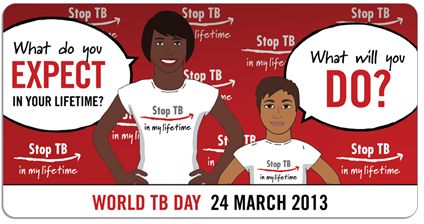World TB Day 2013
March 24th is World TB Day. It commemorates the day in 1882 when Dr Robert Koch announced that he had discovered the TB bacillus which caused tuberculosis and aims to increase public and professional awareness about Tuberculosis (TB). TB disease is preventable and treatable and one of the targets of “The Stop TB Partnership” hosted at the World Health Organization (WHO) is that the incidence of TB disease worldwide will be less than 1 case per million population by 2050 (Elimination of TB as a global public health problem).
In 2013, we enter the second year of the two-year “Stop TB in my lifetime” World TB Day campaign. The theme for World TB Day 2013 is:
“Challenge the world to do more on TB.
Tell the world what you're going to do about it”.

The theme encourages people all over the world, from the youngest to the oldest, to make an individual call for the elimination of TB, and to say what changes they expect to take place in their lifetimes.
WHO and the Stop TB Partnership, are together promoting World TB Day and are calling for the following:
• Zero deaths from TB
• Universal access to TB care
• Faster treatment
• A quick, cheap, low-tech test for diagnosing TB
• An effective vaccine against TB
• A world free of TB
In their lifetimes, today's children should expect to see a world where no one gets sick with TB.
In their lifetimes, women and men should expect to see a world where no one dies from TB.
Ireland
In Ireland, the rates of TB have declined in recent years with 420 cases (9.2 per 100,000) reported in 2010, 424 (rate: 9.2/100,000) in 2011 and a further decline in the number of cases reported in 2012 to 368 (rate: 8.0/100,000). These are the lowest notification rates recorded since TB surveillance began in 1998. This decline is considerable when compared to the 1990s with 604 cases reported in 1992, a rate of 17.1 per 100,000. The decline has been even more considerable since the early 1950s when 7,000 cases of TB were notified annually.
See also: http://www.hpsc.ie/hpsc/A-Z/VaccinePreventable/TuberculosisTB/
However, TB cases are still occurring in Ireland and there is need to be vigilant.
It is important to be aware of the symptoms of TB which include:
• Fever and night sweats
• Cough (lasting more than 3 weeks),
• Weight loss
• Blood in the sputum (phlegm) at any time.
A person with any of these symptoms should visit their family doctor for advice. If someone has a reason to think that they might have TB, they should tell this to their doctor.
Doctors should also be aware of the possibility of TB as a diagnosis when patients present with these symptoms, Anyone can get TB but those most at risk are people from countries with a high incidence of TB, people with weakened immune systems due to disease or medication, people who have been in contact with a case of TB and those who for other reasons may be at high risk e.g. the homeless and intravenous drug users.
Europe
The European Centre for Disease Prevention and Control (ECDC) is focusing on extrapulmonary TB for World TB Day 2013. This is TB which affects parts of the body other than the lungs.
ECDC launched a video documentary entitled "Extrapulmonary Tuberculosis: a challenging diagnosis". Two patient stories illustrate how the diagnosis of extrapulmonary TB diagnosis can be elusive, postponing proper treatment and care. See here.
Worldwide
The WHO has estimated that globally there were 8.7 million new cases of tuberculosis (TB) in 2011 (125 per 100,000 population). While great strides have been made to control and cure TB, it is still a problem and worldwide, TB remains one of the leading causes of death from infectious disease with WHO reporting that approximately 1.4 million TB deaths occurred globally in 2011.
More information on World TB Day 2013 is available at:
Stop TB Partnership
World Health Organization
World TB Day 2013 Facebook
World TB Day 2013 Twitter
World TB Day message from Dr Lucica Ditiu
European Centre for Disease Prevention and Control
Centers for Disease Prevention and Control, USA


